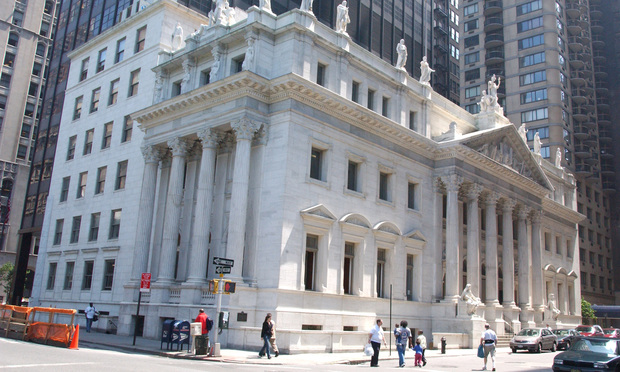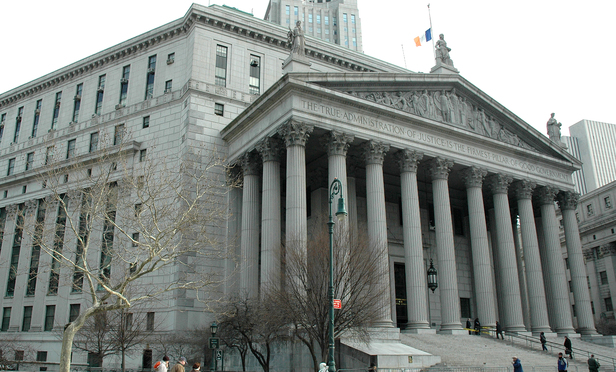David B Saxe

August 20, 2018 | New York Law Journal
From 'Nomura' to 'Ambac': Where Does the Law on Sole Remedy Clauses Stand?Plaintiffs Ambac Assurance Corp. and others (collectively, Ambac), an insurer, sought to use contractual remedies other than the sole remedies clause in connection with its claim that defendants Countrywide Home Loans, Inc. and others, (collectively, Countrywide) breached various representations and warranties contained in the insurance and indemnity agreements (the I&I agreements) between the parties.
By David B. Saxe, Danielle C. Lesser and Michael Mix
8 minute read

July 27, 2018 | New York Law Journal
The Appellant's End Game: Some Thoughts on the Reply Brief and the Rebuttal ArgumentWe go as far as saying that in all but the most unusual situations, the failure to file a reply brief would constitute attorney dereliction.
By David B. Saxe and Y. David Scharf
4 minute read

May 29, 2018 | New York Law Journal
The Ancient Common Law Faithless Servant Rule: Still Relevant in New YorkThe doctrine that faithless servants paid on a “task-by-task” basis need only to forfeit their salary relating to disloyal activities initially developed in federal courts interpreting New York law.
By David B. Saxe and Danielle C. Lesser
15 minute read

March 22, 2018 | New York Law Journal
Former Justices on the Appellate Division, 1st Department, Reflect on Careers and FriendshipsThe New York Law Journal asked if these former colleagues and friends would welcome an intrusion into a recent get-together and they were happy to share some of their thoughts about things past and present at the Appellate Division, First Department.
By David B. Saxe
12 minute read

March 20, 2018 | New York Law Journal
Goodbye 'Yellowstone' Road: Is This the End of the 'Yellowstone' Doctrine?David Saxe and Danielle Lesser discuss '159 MP Corp. v. Redbridge Bedford,' a case in which the Appellate Division, Second Department acknowledged that commercial landlords may employ a strategy that prevents tenants from exercising Yellowstone rights.
By David B. Saxe and Danielle C. Lesser
12 minute read

January 25, 2018 | New York Law Journal
Supersizing the Commercial Division: Is It a Good Idea?David B. Saxe and Danielle C. Lesser write: A meal can be supersized at McDonald's, but should New York County's Supreme Court, Commercial Division be supersized as well?
By David B. Saxe and Danielle C. Lesser
9 minute read

January 02, 2018 | New York Law Journal
Court of Appeals Revisits the Doctrine of Anticipatory RepudiationDavid B. Saxe and Danielle C. Lesser write discuss 'Princes Point v. Muss Dev.', in which the Court of Appeals found that a prospective purchaser's commencement of an action seeking to rescind an amendment to a purchase agreement one month prior to the last day to close on the purchase did not constitute an unequivocal communication to the seller of the purchaser's intention not to perform. The result is a detour into an area of murky jurisprudence that may prove unsettling to the commercial bar that relies on the certainty of precedent and its application in a way that conforms to the realities of commercial practice.
By David B. Saxe and Danielle C. Lesser
15 minute read
October 18, 2017 | New York Law Journal
Loss Causation in Securities Fraud CasesDavid B. Saxe and Danielle C. Lesser discuss the First Department's review of Commercial Division cases, specifically cases addressing the issue of loss causation in the securities fraud context.
By David B. Saxe and Danielle C. Lesser
21 minute read

August 30, 2017 | New York Law Journal
End of Summer at the First DepartmentDespite the separation of time and space, these slower days of August prompt me to think about what must be going on at the Appellate Division courthouse as preparations for a new year begin.
By David B. Saxe
9 minute read

August 04, 2017 | New York Law Journal
Broader Use of Special Masters: A ProposalFederal judges have the authority to appoint a special master, without the parties' consent, to be paid by the parties, to "address pretrial and posttrial matters that cannot be effectively and timely addressed by an available district judge or magistrate judge of the district." We believe that such a rule ought to be adopted in our state civil practice, especially in matters involving complex commercial litigation.
By David B. Saxe and Danielle C. Lesser
6 minute read
Trending Stories
- 1The Law Firm Disrupted: Playing the Talent Game to Win
- 2A&O Shearman Adopts 3-Level Lockstep Pay Model Amid Shift to All-Equity Partnership
- 3Preparing Your Law Firm for 2025: Smart Ways to Embrace AI & Other Technologies
- 4BD Settles Thousands of Bard Hernia Mesh Lawsuits
- 5A RICO Surge Is Underway: Here's How the Allstate Push Might Play Out
More from ALM
- Morgan & Morgan Class Action Attorneys Detail Pathway to Success Within Cybersecurity and Data Privacy Practice 1 minute read
- Holwell Shuster & Goldberg Partners Leverage 'Hostile' Witnesses to Secure $101 Million Verdict Against Walmart 1 minute read
- Legal Speak at General Counsel Conference Midwest 2024: Mike Andolina, Partner, White & Case 1 minute read



